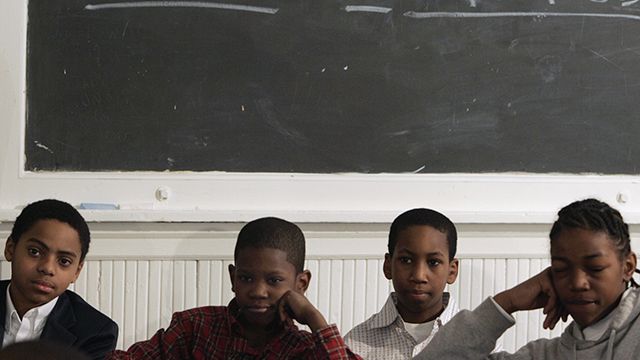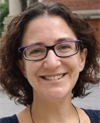As low-income districts experience ever-greater struggles to meet their students’ needs on dwindling budgets, their schools are targets of “reforms” fundamentally different from those serving higher-income students. And, as my own teaching trajectory reflects, these attempted “fixes” can actually exacerbate inequities.

On my first day of unsupervised teaching as a Philadelphia teaching fellow, I followed the assistant principal as she sauntered through the building, seemingly unaffected by the palpable tension. She led me into my classroom, then pointed at me with the antenna of her walkie-talkie and shouted over my students’ clamor, “This is Ms. Hoyson. She will be here for the rest of the year. She is a certified teacher and you are lucky to have her.”
There was nothing lucky about my students’ situation. They lived in a poverty-stricken neighborhood notorious for violent crime. School offered little refuge, as its consistently high incidence of violence placed it on the district’s list of “persistently dangerous” schools.
The building itself showed signs of neglect. I vividly remember walking through the school’s double doors to see the wide and impressive marble staircase that led to the second floor. I imagined the shining stairs that would have greeted students each morning in the 1920s, when the building was new, the neighborhood affluent. Decades later, my students entered the same building confronted by filth.
The school no longer had a library. Nearly all the textbooks had broken spines and were out-of-date. The message might not have been explicit, but it was clear. My students didn’t deserve to have a clean, safe school or basic resources.
To add insult to that injury, people like me — a 22 year-old white female suburbanite from North Carolina with six weeks of lectures on urban education and bare bones teacher training — were entrusted with helping them attain the skills and knowledge that many lacked. The rare expert educators who did work in their school were a fleeting presence; investing in qualified, experienced teachers would have been wasted on them. All these subtle messages made my school an agent of institutionalized racism.
As children of color who had lived segregated lives, my students’ prior interactions with white people influenced their opinion of me. Many assumed that I was rich and that I was a bigot; for the first time in my life, I was the “other” — an interloper. These differences in race, culture and class — both real and imagined — made it difficult for us to connect. It’s easy to build relationships with people with whom you share common experiences, ideas and beliefs, but much less so when the only experiences we shared were in my classroom — and many of those were negative.
From the beginning of the school year through January, when I arrived, my students had had a long-term substitute teacher. Within a few weeks of working with them, I realized that many of the 80 students in my three sections of eighth grade literacy were functionally illiterate. My minimal training had failed to provide the tools I needed to teach 13-year-olds to read, so I reached out for help, but only four of the dozen eighth grade teachers had even three years of experience. Not a single veteran was available to guide our blind-leading-the-blind efforts.
Even if I had had the skills and experience to begin to bridge that academic gap, children cannot learn in chaos. My students were in daily danger of bodily harm; fights erupted in classrooms and hallways and, in my classroom, one student sustained a broken jaw during a fight. Seventh graders hid knives throughout the building to protect themselves from being “jumped” or beaten. Adults in the building who could have stopped this didn’t and I felt powerless to do so.
When the school year finally came to an end, I quit. I felt that I was doing my students no service, I knew that I was doing myself harm and I thought that I would never teach again. But what I learned that year was invaluable.
I learned that poverty means more than lacking money to buy things. For many of my former students, their parents’ lack of education contributed to their lack of school readiness and weak literacy skills. Growing up in poverty led my students to understand that people who made big decisions about their lives believed that what was “good enough” for them was ridiculously little. Over time, they grew to know better than to hope.
I learned, too, that witnessing injustice obligates a person to take action. I went back to school and became a credentialed teacher, so that I can provide future students what they need and deserve. Now I am studying education policy to better understand how myths like that of the “Philadelphia fiscal crisis” enable those with power to allot so little to “those students.” Whether or not I ultimately end up in the classroom, I intend to be a vocal critic of reforms that pretend to provide more for our most disadvantaged kids while actually depriving them of fundamental basics.
This commentary is the fifth in a series produced for the Broader, Bolder Approach to Education by educators across the country who want to illustrate the impact of poverty on their classrooms, schools and communities and propose education policies with real promise to weaken the poverty-education link.



